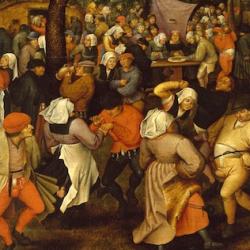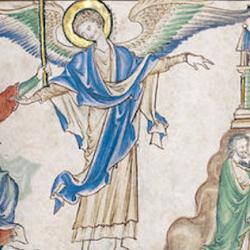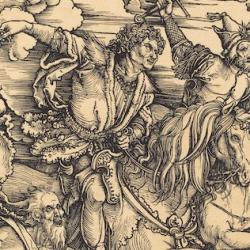Everyone knows that John’s writings are vastly important in the New Testament and in Christian theology, but Paul Rainbow claims in his recent Johannine Theology that “a comprehensive survey of the Johannine theology is wanting in current English-speaking New Testament scholarship” (32).
In a footnote, he lists a half dozen surveys of Johannine theology from the late 19th century to the present, but some are dated and others leave out Revelation. Rainbow takes account of all John’s writings. After assessing the arguments concerning the authorship of Revelation, he observes that “To segregate the documents and caricature their differences could skew the theological picture as badly, should they have emanated from a single hand, as to coordinate the documents would do, should they form a plurality of minds.” Just so. He concludes that “The attribution to John, allowing for some editorial help, fits the data better than any alternative” (51).
Rainbow’s book is thorough and sticks close to John’s texts. And the book includes theological flights like this: “In what sense does John imagine the Son to be derived from the Father? . . . to have life in oneself, to be characterized by aseity, has been ‘granted’ to the Son by the Father (Jn 5:26). This is why the Son has life not ‘through’ the Father as the efficient cause of his existence, in the way the world does . . . but rather ‘because of’ the Father as his exemplary cause” (101-2).
Then this summary of Johannine Trinitarianism: “To be theos, to have life in oneself, belongs to God alone. It belongs to both the Father and the Son, but it belongs to the Father intrinsically and to the Son by gift. Aseity is of the Father, and he communicates it to the Son. The Father initiated the infinite gift, and the Son received it. What is given does not come into being, change or pass out of existence, for it is the plenitude of life; but an Uncreate whose property it is can donate it to another Uncreate whose property it becomes. Becoming is not found in the divine essence itself; it describes the eternally existing Son’s way of coming into possession of it. Were the having of life in oneself the original, independent property of both, there would be not only two eternals, but also two principles, fathers, powers in heaven – to gods. The unidirectional, nonreciprocal communication of the Father’s essential being to the Son establishes the Father as the radical unit within the Godhead. It is in this sense . . . that the Father is greater than the Son” (102).
Overall, this expresses John’s teaching, but Rainbow’s statement about “becoming” is problematic. It might suggest that the Son is somehow there already before the reception of the divine essence, waiting for the Father’s gift. And it implies that the essence is some kind of something something – a set of properties perhaps – that can be passed from one to the other, and that might (hypothetically) be retained by the Father alone. If God is eternally Father and Son, it would seem that the divine essence is essentially given and received, and thus “becoming” must be essential to God. Even on Rainbow’s formulation, “becoming” is inherent in the eternal life of the Trinity, as a description of what happens in the Father’s gift of life to the Son.















